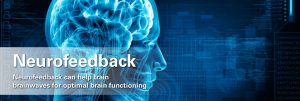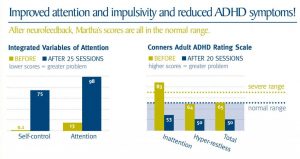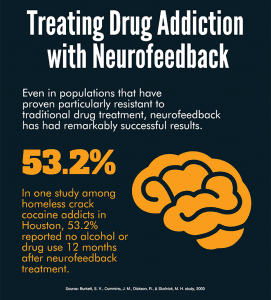
Neurofeedback therapy is a relaxing and universally beneficial type of brain training that can both improve overall mental functioning and peak performance as well as be used to help with a number of different psychological disorders such as Depression, ADHD/ADD, Insomnia, Anxiety, Chronic Stress, and others. Neurofeedback is effective on such a wide range of issues because it addresses the underlying brain wave imbalance that all these disorders share. While Neurofeedback is still not a common or very well known practice, it has been in use since the 1960’s when it was discovered as a way of drastically reducing seizure frequency; since this discovery, NASA has even integrated Neurofeedback as a part of their astronaut training protocol.
Below is a list of conditions which Neurofeedback has been found effective for:
-
Anxiety
-
ADD(Attention Deficit Disorder)/ADHD(Attention Deficit Hyperactivity Disorder)
-
Epilepsy
-
Depression
-
Early Onset Alzheimers
-
Insomnia
-
Chronic Stress
-
Alcohol/Drug Addiction Recovery
-
PTSD
-
Migraines
-
Autism Spectrum Disorder (ASD)
Neurofeedback for ADHD
In 2016 the Center for Disease Control (CDC) reported that 6.1 million children (nearly 10% of the children in the United States) have been diagnosed with ADHD and the most common treatment taken for ADHD by far is stimulant medication (1). While stimulants can help patients function and focus in the short term, they often come with many side effects and do not address any of the underlying issues of ADHD.
One of the reasons why people with ADHD have difficulty focusing is because their brain is producing too many beta waves. While beta waves generally help us with focus and concentration, when there is too much beta it becomes difficult for the person to focus on any one thing and very easy for them to be distracted by something new. Through neurofeedback, the client’s brain begins to be able to recognize that it is over producing beta waves and start training itself to have more balanced brain wave activity.
Alleviating symptoms of ADHD is one of the most common and documented uses of Neurofeedback. In 2017 a meta-analysis on the effects of Neurofeedback on ADHD and Attention Deficit Disorder in adults showed significant improvement nearly universally in the Neruofeedback groups when compared to the control groups (2). One of the main benefits of using Neurofeedback for ADHD or other disorders is that is virtually risk free and will have no counter or negative reactions with any other form of medication or treatment. In fact, time and again studies have shown that traditional treatments are more effective when in conjunction with sessions of Neurofeedback.
Below is a graph from The Neuro Development Center showing significant improvements in a patient’s ADHD symptoms.
For a first hand account of the benefits that Neurofeedback can bring someone with ADHD, please watch the video below:
Neurofeedback for Substance Abuse/Addiction Recovery
Another major application of Neurofeedback has been assisting the recovery of those who have been addicted to harmful substances such as alcohol and prescription or recreational drugs. In 2014 the National Survey on Drug Use and Health found that over 20 million Americans had struggled with substance abuse that year (3). The effects of continued substance abuse (especially alcohol) makes it very difficult for the substance abuser to change their patterns of thinking or behavior, even if they recognize their own self destructive tendencies. Neurofeedback can act as a ‘change-agent’ lending empowerment to a substance abuser, and fostering sobriety or rehabilitation.
Those with a history of substance abuse often feel like they have little choice or control over their life. Neurofeedback helps clients to gain control of their life; patients who complete 10 or more sessions of Neurofeedback experience a greater ability to control and regulate their thoughts and emotions. Once clients achieve a greater control over their own thoughts, it becomes much easier for them to take that control and agency in to the rest of their life.
Substances such as alcohol, opiates, and benzodiazepines produce feelings of pleasure through the production of Dopamine. While Dopamine can be produced naturally through physical activity such as running, an excess of Dopamine has a number of negative effects such as agitation, lowered attention span, and irritability. It has also been shown that addiction causes structural changes in the brain which can be very difficult to remedy. Neurofeedback helps show the brain that it doesn’t need the coveted drug to function and that the person can achieve calm and happiness while sober.
While Neurofeedback alone can’t cure addiction, it is a powerful tool in the recovery process.
Neurofeedback through Neuroptimal®
At The Natural Medicine Center of Lakeland, the Neurofeedback system we use is NeurOptimal® Advanced Brain Training System developed by the Zengar Institute in Canada. NeurOptimal® is designed to bring balance to clients’ brain waves by providing instantaneous audio feedback whenever erratic brain wave activity is detected. These little skips in the music prompt the brain to reorganize its activity and move to a more coherent state of functioning. Essentially, the system provides your brain with a mirror so it can see how it is functioning and learn where to change and improve.
The reason that Doctors at the Natural Medicine chose NeuorOptimal®, over alternate Quantitative EEG systems is because NeurOptimal® is exceptionally safe and non-invasive. Because no ‘current’ is infused, we aren’t forcing any changes in your brain or perturbing body chemistry! NeurOptimal® produces no major negative side-effects and can easily be added to any pharmacotherapeutic or counseling regimen.
A session of Neurofeedback includes having five harmless metal sensors placed on the clients scalp and ears while they actively watch and listen to the programs audio and visuals for a little over half an hour.
For a brief explanation on how NeurOptimal® works, please watch the short animated video below:
Neurofeeedback Rates:
Session Bundles – 5 sessions for $325 or 10 sessions for $600
Individual Sessions – $70
Senior Citizen Discount (Over 55) – $65 per session
References:
1. https://www.cdc.gov/ncbddd/adhd/data.html
2.Van Doren, J., Arns, M., Heinrich, H. et al. Sustained effects of neurofeedback in ADHD: a systematic review
and meta‑analysis. European Child & Adolescent Psychiatry (2018).
3. https://americanaddictioncenters.org/rehab-guide/addiction-statistics
For even more on Neurofeedback and NeurOptimal® , please follow the links below to see some Facebook live videos and blog posts that we have created.
Facebook Live Videos:
https://www.facebook.com/pg/naturalmedicinecenterlakeland/videos/?ref=page_internal
Blog Posts:
http://naturallakeland.flywheelsites.com/neurofeedback/
http://naturallakeland.flywheelsites.com/all-about-brainwaves/
http://naturallakeland.flywheelsites.com/neuroptimalneurofeedbackmeditation/


